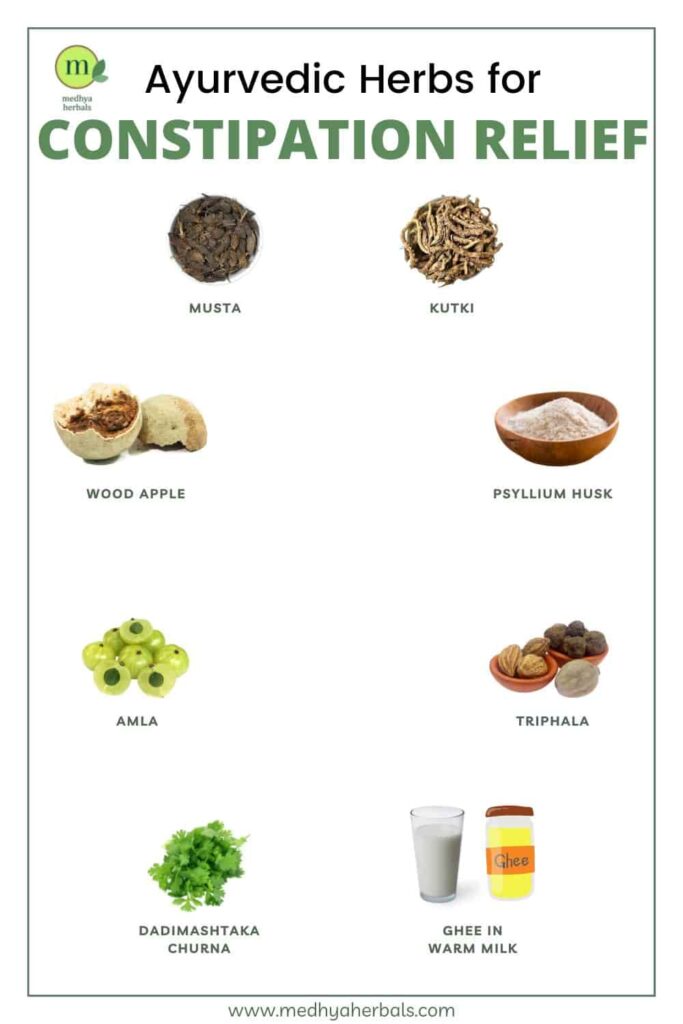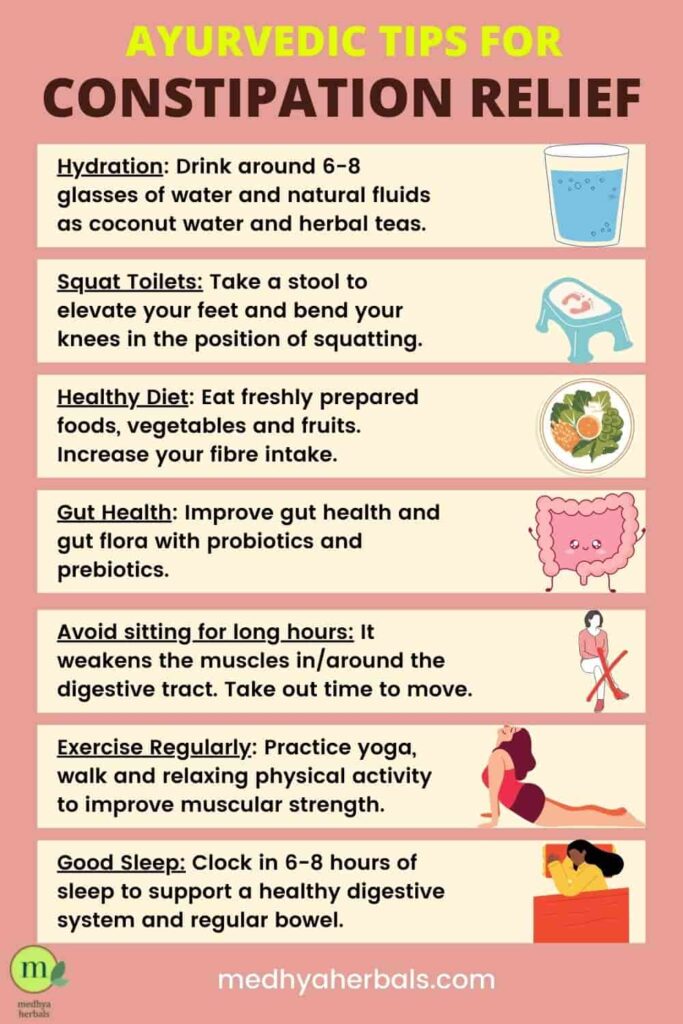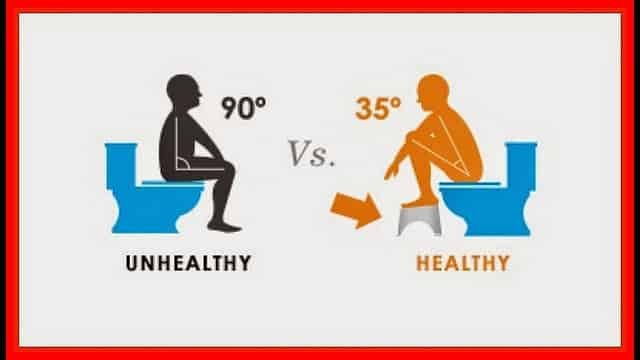Irregular bowel movement, tightness in the belly, gas, burping, and dry hard stools are some of the common symptoms of chronic constipation.
The unease of constipation may often prompt you to experiment with laxatives and purgatives, yet they do not give permanent relief. Often these laxatives also lose their effectiveness with time and you may be prompted to try stronger bowel support or become regular with them through increased dosage!
If you are experiencing constipation, it is important to see a doctor to rule out any underlying medical conditions. Ayurvedic treatment takes a holistic approach to treat chronic constipation at the root cause level. Ayurvedic herbs along with diet and lifestyle changes are highly effective to provide permanent constipation relief and regulate the bowel movement.
What is Bowel Movement?
Stools are formed as a result of digestion of the food we ingest. After we eat food, it passes through various organs of the digestive tract, where all the nutrients are absorbed into the body.
This usually takes 2-24 hours depending on the type of food consumed. After the nutrients are absorbed from the food, the waste (stool) travels to the rectum.
This stretches the rectum and triggers a message to the brain indicating that the bowel is full and needs to be emptied. In a healthy individual, the stools are usually soft and pass out easily at least once daily. For most people, this is a routine activity that happens at the same time every day.
Stool Formation and Bowel Movement Process
The movement of the food through the digestive tract is controlled by the regular peristalsis (movement) of the intestines. That’s why proper toning and function of the digestive tract muscles is essential for regular movement of the food and stool.
The function of colon is primarily to absorb water from the food. That’s why if the stool remains in the colon for long (either due to poor muscle function or lack of fibre and water), it starts to become drier and harder. This makes it difficult to pass the stool.
Constipation and Irregular Bowel Movement
Constipation arises when the stools become difficult to pass, change in consistency to hard and dry and the bowel movement becomes absent and irregular.
The symptoms of irregular bowel movements become more pronounced when we are traveling or in stressful situations. Generally, constipation is quite common in childhood and in the old age.
Health Risks of Chronic Constipation
Chronic constipation is a condition where a person has difficulty in bowel movement or has an unusually dry stool on regular basis. Basically, it is persistently irregular and infrequent or difficult evacuation of the bowels. It is determined in the colon that is responsible for accumulating and eliminating the stool.
A regular bowel movement is an essential natural way for our body to get rid of the toxins. That’s why chronic constipation and irregular bowels put you at risk of multiple health complications related to hormone imbalances, hemorrhoids, Colitis, Obesity and Insulin Resistance.
- Bowel obstruction
- Hemorrhoids
- Rectal prolapse
- Hernia
- Spastic colitis
Causes of Chronic Constipation
Daily bowel movement is one of the essential signs of a functional digestive system. However, a busy and fast paced lifestyle taxes the digestive system resulting in irregular or difficult bowel movement.
The incidence and severity of constipation has become quite common. Nearly everybody is affected by chronic constipation and irregular bowel movement at one time or the other. Here are some of the factors that lead to or aggravate constipation problems:
1. Poor Diet
The most common cause of constipation is a poor diet that is rich in processed foods such as white carbohydrates, sugar, and unsaturated fats.
The food that we eat needs to contain fiber. The benefit of eating fiber-rich food is that fiber increases the bulk of stools and softens it. This makes it easier to pass out stools. Lack of fiber can make the stool hard.
2. Insufficient fluids
Sufficient hydration is essential to keep the stools regular, soft and mobile. On the other hand, insufficient fluid intake leads to dryness and hardness of stools.
Water, herbal tea, and fruits hydrate our bodies and support regular bowel movements. Other liquids such as coffee and soft drinks that contain caffeine seem to have a dehydrating effect.
3. Lack of Exercise
Lack of exercise can also lead to constipation. Fewer movements and inactivity increases the difficulty in passing stool on regular basis. This is due to weakened muscles of the digestive tract.
4. Medications
Pain relievers and generic medications such as antacids, antispasmodic, antidepressants, iron supplements, and diuretics can aggravate the problems of constipation in an individual.
5. Irritable Bowel Syndrome (IBS)
Also known as spastic colon, IBS causes spasms in the colon that affect bowel movements. Other symptoms include abdominal cramping, gas and bloating.
Although IBS is a chronic condition, it is not life-threatening. It often worsens with stress.
6. Changes in Daily Routine
Constipation can arise when your routine changes. One often becomes constipated during travel due to changes in normal diet and daily routine.
7. Pregnancy
During pregnancy, women may be constipated because of hormonal changes or because the heavy uterus presses the intestine, thus affecting its normal peristalsis movement.
8. Stress
Excessive stress can slow down the digestive system and regular function of the intestines. This leads to poor digestion symptoms of incomplete bowels, hard stools, absent bowel movement or a feeling of heaviness and bloating.
9. Lack of Sleep
Sleep is essential for healthy digestive fire. Lack of sleep slows down our metabolism and digestive system functioning. It also creates a situation of untimely and irregular bowels, which often lead one to constipation.
Symptoms of Chronic Constipation
Constipation leads to dryness and irregularity, which causes hard and dry stools that are difficult to pass. You may need to strain or spend more time in the toilet to pass out the stools. Incomplete bowel movement, heaviness, gas and bloating are some of the common discomforts that accompany constipation.
Additionally, hard stools and straining of the muscles in the rectum can lead to fissures (cuts) in the anus or piles (hemorrhoids). A more troublesome problem arises when one is unable to pass out stools. This situation needs to be addressed immediately, if it happens for more than 3 days.
Here are the abdominal discomforts that you may have as a result of constipation:
- Difficult bowel movement
- Abdominal pain
- Nausea/Vomiting
- Weight loss or weight gain in chronic constipation
- Feeling uncomfortable
- Diarrhea
- Abdominal swelling
- Loss of appetite
- Low Mood and Irritability
Constipation Treatment in Ayurveda
Constipation is known as Vibandha in Ayurveda. It arises primarily as a result of vata dosha imbalance. Alternatively, it can also arise as a result of excess Kapha that blocks the flow of vata dosha.
Vata dosha regulates circulation and movement in the body. Out of the five types of Vata Dosha, Apana Vayu is specifically responsible for downward movements as urination, menstruation and elimination of bowel. That’s why an imbalance in the Apana Vayu dosha affects colon function by weakening its muscles causing constipation. Additionally, dry, rough and hard characteristics of vata make the stool inconsistent and irregular.
In Ayurveda, chronic constipation is handled at its root cause so that the bowels become regular and normal in consistency. Additionally Ayurvedic lifestyle and daily routine helps to relieve stress and promotes muscle strength of the digestive system. Thus, Ayurvedic treatment helps you to improve your digestive fire and support the digestive tract functioning so that constipation is relieved for good.
Ayurvedic Herbs for Chronic Constipation Treatment
Ayurvedic herbs are safe and gentle on the body. They correct vata dosha imbalance, support digestive system function and ensure normal bowel movement.

1. Triphala
Triphala is a revered Rasayana in Ayurveda. It supports our digestive system, helps to assimilate nutrients from the food, and also promotes regular bowel movement.
Consuming Triphala before the bed with lukewarm water for a month will help relieve the symptoms significantly and make a significant difference to your body.
2. Amla
Amla or Indian Gooseberry is rich in fiber, vitamins, and flavonoids that nourish the body inside out. It supports the digestive system. It also reduces the heat and dryness in the body, which are the primary causes of constipation.
3. Bael Fruit or Wood Apple
A tropical plant that is widely available in the summer season in India. It has a positive effect on the body, supports the digestive system by promoting regular bowel movement, and lowers down blood sugar and cholesterol levels.
4. Ghee in Warm Milk
Adding a tablespoon of cow’s ghee in warm milk along with 1 teaspoon sugar, when consumed on a regular basis can help relieve constipation.
5. Psyllium Husk
Psyllium Husk or Isabgol is rich in soluble fiber and has multiple health benefits including lowering down of cholesterol and helping manage blood sugar levels.
It has no side effects on the body and can be taken on a regular basis with lukewarm water in the night to support bowel movement.
6. Kutki
A common symptom associated with constipation is poor appetite. Kutki can remove this and improve your appetite. Here are some additional benefits of consuming Kutki:
- Enhances metabolism
- It improves digestion and absorption
7. Dadimashtaka Choorna
It improves digestion and reduces the frequency of bowels. It also helps to alleivate the vata dosha, thus relieving from symptoms of bloating and abdominal cramps.
8. Musta
Nutgrass or musta helps to improve digestion and push the toxins out of the body. It ignites the digestive fire, improves the metabolism and absorption of nutrients.
Lifestyle Tips for Chronic Constipation Relief
The best Ayurvedic treatment for constipation recommends lifestyle changes to improve body metabolism. This not only treats constipation but leads to a general improvement in health.

Here are some lifestyle guidelines that will help you to find relief from constipation at the root cause level:
1. Squatting
Considered to be the best natural position to help expel stool from your colon and reduce your risk of hemorrhoids. Try placing a stool near your toilet to raise your knees, purchasing a special squatting device to modify your toilet, or simply squatting on your own toilet to ease bowel movements.

2. Eat plenty of fibre-rich foods
You should aim to get about 50 grams of fiber per 1,000 calories consumed. Vegetables are phenomenal sources of fiber. Eat rainbow foods in their whole forms and with traditional recipes.
Add flax seeds, chia seeds, basil seeds and various other seeds to give the required amount of fiber to your body.
3. Exercise Regularly
Exercise stimulates circulation and intestinal function, causing your bowels to move properly. Regular practice of yoga asanas also helps to provide relief from constipation symptoms and promotes regular bowel movement.
4. Probiotics
Probiotics help to balance the good bacteria in your gut, which is essential for proper digestive function. They are also useful in fighting IBS, which contributes to constipation.
Yogurt, Fermented Foods, Cheese, Pickles, and fermented drinks are all great sources of natural probiotics.
5. Prebiotics
These are foods that act as food to our gut bacteria or our microbiome. Prebiotics feed our flora and hence support the digestive system.
Cruciferous vegetables such as Broccoli, Cauliflower, Cabbage, and Roots such as Onions, Garlic, Beets, Carrots, Radishes, Chicory, and Yams are great sources of Prebiotics.
6. Good Night Sleep
A good sleep cycle with minimum of 7 hours per day significantly supports the functioning of the body. It helps to bring our tired systems on track and helps to replenish the vital micronutrients that we need to support our digestive system.
That’s why lack of sleep directly leads to digestion problems such as chronic constipation, bloating, incomplete bowels.
The Best Diet for Chronic Constipation Relief
Your diet “ahara” goes a long way to determine your digestion and elimination. In this case, you want to keep your bowel movement regular and get right consistency of stools. Therefore, plan your diet with that in mind.
Best Foods & Food Habits for Regular Bowel Movement
- Include lots of fruits, vegetables, legumes, and fibers in your diet. Eat them fresh. Take beans, peas, and other edible seeds.
- Focus on green leafy vegetables, variety of colors, herbs and spices in your meals.
- Eat healthy meals regularly and at the right times. Irregular meals disturb vata dosha.
- Favor ghee, nuts like almonds, walnuts, pecans, flax seeds, sunflower seeds and pumpkin seeds, buttermilk, avocado, beets, lentils.
- Focus on increasing intake of root vegetables as sweet potato and yams. They are rich in antioxidants, fibre and also help to pacify the vata dosha.
- Avoid sugar as much as you can. You can go for honey as an alternative sweetener.
- Increase your water intake. Warm water is specifically helpful for regular bowel movement and good digestive fire.
Foods to avoid for Constipation
- Fast foods like pizza, sandwiches, burgers, fries, etc, are not your friends at this point. They tax the digestive system and push the health of digestive tract with tonnes of chemicals.
- Remove alcohol and smoking altogether. They have extensive drying effects on the body.
- Reduce intake of caffeine. It has drying and constipating effect, specifically when taken on an empty stomach.
- Avoid heavy to digest dairy foods such as old cheese, sheep’s milk cheese, and buffalo mozzarella.
- Eliminate foods with a cold potency and cold temperature such as cold and frozen foods or drinks, and carbonated drinks.
- Cut off unhealthy fats from your diet.
- Reduce your consumption of animal based products and processed foods. They are hard to digest and stay in the digestive tract for longer, leading to constipation and dryness.
- Reduce your intake of dairy, except buttermilk or takra.
Yoga Poses for Constipation Relief
Yoga goes much deeper than just the physical movement of the body. Regular practice of suitable yoga asana help to tone the muscles thus increase strength, relax the mind to reduce stress levels and also improve digestive fire.

That’s why yoga is one of the best ways to naturally support your physical and mental health. Here are some yoga asana that you can practice to find relief from constipation and poor digestive system health.
- Setu Bandhasana (Bridge)
- Bhujangasana (Cobra)
- Dhanurasana (Bow)
- Ardha Matsyendrasana (Seated Half Spinal Twist)
- Natarajasana (Supine Dancing Shiva)
- Sarvangasana (Shoulderstand)
- Janu Sirsasana (One Legged Seated Forward Bend)
- Surya Namaskara (Sun Salutations)
- Vajrasana (Thunderbolt Pose)
Takeaway
I have shared a lot of really helpful tips for you to find relief from constipation. However, as a note of caution, you should not just go ahead experimenting with your health. Ensure you consult with your doctor or qualified healthcare specialists to guide you.
If you would like to seek Ayurvedic treatment for chronic constipation, do contact Medhya Herbals for an online consultation and to chart out your personalised health plan for regular bowel movement.
FAQ
1. Constipation in Children
Irregular bowel movement and constipation are quite common in children. It usually gets aggravated by over consumption of processed foods, lack of hydration and holding off the urge to defecate. Additionally fear (aggravates vata dosha) of toilet training, exams, change of place or life (going to school) may lead to constipation in kids. Lack of exercise and poor eating habits as watching TV or lying down after/during food can affect them severely causing constipation, stomach pain and bloating. Since the digestive fire of children is weak, it needs to be taken care of with warm, unctuous and regular meals.
2. How do you lubricate your intestines in Ayurveda?
One way to keep the doshas in balance is to lubricate the intestines. This helps to prevent constipation, which can lead to an accumulation of toxins in the body. There are a few different ways to lubricate the intestines in Ayurveda. One is to eat a diet that includes plenty of fresh fruits and vegetables, which are high in fiber and water content. Another is to consume moderate amounts of fats, such as ghee or coconut oil. Finally, you can also take herbs or supplements that are specifically designed to lubricate the intestines and promote digestive health. By following these simple guidelines, you can maintain a healthy balance of doshas and avoid many common illnesses.
3. Is ghee good for constipation?
Ghee is a type of clarified butter that has been used in ayurvedic medicine for centuries. Unlike other forms of butter, ghee is made by simmering butter until the water evaporates and the milk solids settle to the bottom of the pan. This process not only removes impurities, but it also concentrates the butter’s fat and flavor. Ghee is a rich source of butyrate, a fatty acid that has been shown to have protective effects on the gut. In addition, ghee is easy to digest and can help to lubricate the intestines, making it an ideal food for those with chronic constipation. Although ghee is a healthy food, it should be consumed in moderation as part of a balanced diet.
4. When should I be concerned about constipation?
Constipation is a common digestive issue, characterized by infrequent or difficult bowel movements. While it can occasionally be uncomfortable, constipation is usually not dangerous. However, there are some situations in which constipation may be cause for concern. For example, if you are experiencing severe pain or bleeding during bowel movements, you should see a doctor as soon as possible. Additionally, if you have noticed a change in your bowel habits that lasts for more than a couple of weeks, it is also worth seeking medical advice. Chronic constipation can sometimes be a symptom of an underlying health condition, so it is important to rule out any potential causes. In most cases, however, constipation can be managed with simple lifestyle changes, such as eating a high-fiber diet and staying hydrated.
5. What are the signs of a blocked bowel?
A blocked bowel can be a very serious condition. The main symptom is abdominal pain, often severe. Other symptoms may include vomiting, constipation, bloating, and weight loss. If you experience any of these symptoms, it is important to see a doctor right away. A blocked bowel can be caused by a variety of things, including a buildup of feces, a tumor, or an obstruction in the intestines. Treatment will depend on the cause of the blockage. In some cases, surgery may be necessary to remove the blockage. However, in most cases, the blockage can be treated with medication and lifestyle changes. If you have a blocked bowel, it is important to see a doctor so that you can get the treatment you need.
6. What are the worst symptoms of chronic constipation?
Constipation is a common digestive problem that can cause a variety of uncomfortable symptoms. The stool becomes hard due to the lack of water in the intestine and rectum. Chronic constipation can also be caused by a lack of dietary fiber, medications, and colon cancer. The worst symptoms of constipation are abdominal pain, bloating, and rectal bleeding. Abdominal pain is caused by the hardening of stool in the intestine which puts pressure on the abdominal muscles. This leads to bloating as the stomach is unable to expand fully. Rectal bleeding is caused by the rupture of blood vessels in the anus due to straining during bowel movements. If you are experiencing any of these symptoms, it is important to see a doctor as soon as possible.


Good morning, Dr. Bansal.
I had radiation on my thyroid, the doctor still has me on Synthroid 75 mg. I'm still very tired, constipation every week. I've had three spine surgeries also. I'm still getting over Covid.
Is there someone you can refer me to in the Ellicott City Maryland if you are not in this area?
Sincerely!!!!
Hello Wendy, we can help you out over a video call consultation. Please check here to make an appointment with Dr. Bansal https://medhyaherbals.com/ayurvedic-treatment/